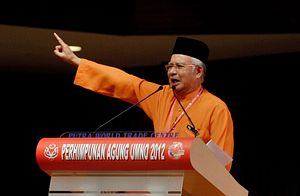In an unexpected reversal, Malaysian Prime Minister Najib Razak on Thursday decided to renege on an earlier vow to discard a controversial sedition law. Instead, his government will bolster the British colonial-era Sedition Act. Critics of the Sedition Act in Malaysia have argued that it stifles freedom of speech and is open to abuse by the government. The law was originally instated in the final years of British colonial rule and was intended to root out communists. Najib had promised in 2012 that the law would be repealed.
Najib, in a speech at the general assembly of the United Malays National Organization (UMNO) , noted that the Sedition Act would not only not be removed from Malaysian law as previously intended, but would further be amended to protect against insults to Islam. He added that other religions would also be included in the provision on religious speech:
“This act will not only be maintained, but strengthened. At least two items: there will be a special provision to protect the sanctity of Islam, while other religions also cannot be insulted.
Secondly, we will insert a provision so that action is taken against anyone who calls for the secession of Sabah and Sarawak.”
The Malaysian law could come to resemble a sort of anti-blasphemy law, effectively going further to stifle free speech in the country. Najib was transparent about the executive nature of the decision, noting his authority as the prime minister to decide against repealing the 1948 law. According to report, the decision was met largely with approval from delegates at the UMNO general assembly.
One concern among political activists against the Sedition Act is its potential for abuse by the government in targeting political opponents. Over the past year, prosecutors have charged numerous anti-government activists in Malaysia under the Sedition Act for comments against either the sultan or the government. Specifically, according to Reuters, “Out of more than a dozen prosecutions under the Act this year, at least five have centered on comments voiced about the sultans or their powers.”
The decision to not repeal the law has disappointed Malaysia’s opposition. Najib had originally promised to repeal the law ahead of Malaysia’s last general election in a bid to appeal to more progressive voters. Back then, he described the law as archaic and contrary to Malaysia’s democratic values. However, as his remarks this week made clear, Najib has since had a change of heart.
































